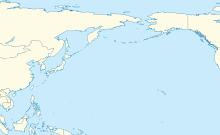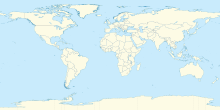Songshan Airport
Taipei Songshan Airport Songshan Air Force Base 臺北松山機場 空軍松山基地 | |||||||||||
|---|---|---|---|---|---|---|---|---|---|---|---|
AMSL 5 m / 18 ft | | ||||||||||
| Coordinates | 25°04′10″N 121°33′06″E / 25.06944°N 121.55167°E | ||||||||||
| Website | www | ||||||||||
| Maps | |||||||||||
 | |||||||||||
| Runways | |||||||||||
| |||||||||||
| Statistics (2018) | |||||||||||
| |||||||||||
| Taipei Songshan Airport | |
|---|---|
Hanyu Pinyin | Táiběi Sōngshān Jīchǎng |
| Hakka | |
| Pha̍k-fa-sṳ | Thòi-pet Tshiùng-sân Kî-chhòng |
| Southern Min | |
| Hokkien POJ | Tâi-pak Siông-san Ki-tiûⁿ |
Taipei Songshan Airport (
The civilian section of Songshan Airport has scheduled flights to domestic destinations in Taiwan and international destinations including
History

The airport was built in 1936 during
Shared military and civilian use—both domestic and international—began on 16 April 1950
Service to Taichung and Chiayi was stopped in mid-2007 after the load factor dropped significantly due to the Taiwan High Speed Rail's start of revenue service in January 2007. Passenger volume decreased from 6.7 million in 2006 to 4.4 million in 2007 (a 34% decrease).[7] Also due to the opening of the high speed rail line, on 1 March 2008, Uni Air suspended its service to Kaohsiung, while Far Eastern Air Transport suspended its service to Tainan.[8] TransAsia Airways decided to stop flights to Tainan and Kaohsiung after 1 August 2008.[9][10]
In early 1999 when the construction of
Regular cross-Strait charter flights to China started on 4 July 2008, with Songshan receiving the majority of flights.[12] Direct flights to China were an issue of contention. Then-mayor Ma Ying-jeou had been pressing to make Songshan Airport Taipei's main International terminal, citing that its location close to the city center would make it preferable for business travelers. However, building height restrictions around the airport raised concerns about flight safety, blocking of radio communications, noise pollution, and a reduced number of flights.[13]
The continuing growth of Taipei City means that Songshan airport is situated in the heart of downtown Taipei. Compared to
Due to the introduction of Taiwan-China flights and future international potential, the airport is undergoing extensive renovations, the first phase of which is expected to be completed by October 2010.[14] The second and third phase renovations are expected to be completed by March and October 2011, respectively. However, as of November 2011 renovations are still in progress. A new international cargo terminal is being built in anticipation of a new air route between Taiwan and Japan.[15] The unused Terminal 2 was refurbished to accommodate arriving flights while the main Terminal, now Terminal 1, was rearranged to handle increased passenger traffic.[12] On 29 March 2011, the renovated Terminal 2 was re-opened to handle domestic flights.[16]
International potential


Similar to
On 6 March 2009, Japan and Taiwan signed a
On 14 June 2010, direct flights between Taipei–Songshan and Shanghai–Hongqiao began.[19] Each week has 28 flights, served by China Eastern Airlines, Shanghai Airlines, Air China, China Airlines, EVA Air, and TransAsia Airways. The airport will undergo upgrades to its runway and reduce its jet bridges from eight to six to accommodate wider contemporary aircraft such as the Airbus A330 and Boeing 767.[20]
Airlines and destinations
The following airlines operate regular passenger flights at Songshan:
Traffic and statistics
In 2018, Songshan Airport handled 6,225,932 passengers and 47,132.9 tons of cargo.[1] The route between Taipei Songshan and Kinmen is the busiest domestic route in Taiwan, with 1,267,630 travelers in 2018.[24] In 2018, the ten routes with the largest number of passengers are as follows:
| Rank | Airport | Passengers 2018 | Carriers |
|---|---|---|---|
| 1 | 1,418,248 | China Airlines, EVA Air, All Nippon Airways, Japan Airlines | |
| 2 | 1,267,630 | Mandarin Airlines, UNI Air | |
| 3 | 1,036,535 | Mandarin Airlines, UNI Air | |
| 4 | Shanghai–Hongqiao
|
727,278 | China Airlines, EVA Air, Air China, China Eastern, Shanghai Airlines |
| 5 | Matsu Nangan
|
252,172 | UNI Air |
| 6 | 249,056 | Mandarin Airlines, UNI Air | |
| 7 | 242,363 | China Airlines, EVA Air, Eastar Jet, T'way Air | |
| 8 | Shanghai–Pudong
|
205,552 | UNI Air, Shanghai Airlines |
| 9 | 162,734 | Mandarin Airlines, XiamenAir | |
| 10 | 147,771 | UNI Air, XiamenAir |
Ground transportation

Metro
The airport is served by the Songshan Airport metro station on the Wenhu line of the Taipei Metro.[27] The TR Songshan Airport Line also formerly served Songshan Airport from 1936 until 1976.
Bus
Several city buses also serve this airport, providing frequent links to the
Accidents and incidents
- On 23 October 1944, a Japanese passenger transport plane crashed into the Taiwan Grand Shrine on Jiantan Mountain shortly after take-off from then Matsuyama Airfield. Many parts of the shrine, including the Torii ceremonial archway and stone toro lanterns, were damaged in the crash.[28]
- On 18 August 1945, a Japanese Type 97 Heavy Bomber departing for Dalian failed to take-off and crashed into flames. Subhas Chandra Bose and Lt. Gen. Tsunamasa Shidei of Imperial Japanese Army are killed in this accident.[citation needed]
- On 20 February 1970, Douglas DC-3 B-243 of Far Eastern Air Transport crashed into a mountain shortly after take-off. The aircraft was operating a cargo flight, both crew were killed.[29]
- On August 12, 1970, CFIT accident.[citation needed]
- On 7 October 1974, a Vickers Viscount of Far Eastern Air Transport was the subject of an attempted hijacking. The hijacker was overpowered and the aircraft landed at its intended destination of Taipei Songshan Airport.[30]
- On 1 February 1975, Mandala Airlines was damaged beyond economic repair when it overran the runway.[31]
- On 31 July 1975, Vickers Viscount B-2029 of Far Eastern Air Transport crashed killing 27 of the 75 people on board.[32]
- On 22 August 1981, Boeing 737-200 of Far Eastern Air Transport broke up after takeoff from Songshan, killing everyone on board.[33]
- On 10 October 1997, a C-130 Hercules 1310, c/n 5067, delivered October 1986, same August 1996. The aircraft crashed during an attempted go-around killing all 5 on board.[citation needed]
- On 4 February 2015, ATR 72-600 (B-22816), crashed shortly after takeoff from Taipei Songshan Airport, first clipping a taxi and then crashing into Keelung River near Taipei. Of the 53 passengers and 5 crew members, 43 were killed.[34]
See also
References
- ^ a b "5、民航運輸各機場營運量-按機場分" (PDF). www.caa.gov.tw (in Chinese). Retrieved 27 January 2019.
- ^ "SUNGSHAN". World Aero Data. WorldAeroData.com. Archived from the original on 2 March 2020. Retrieved 2 March 2020.
{{cite web}}: CS1 maint: unfit URL (link) - ^ "Introduction to TSA". Taipei Songshan Airport. Retrieved 17 June 2010.
- ^ a b c d e f "A Review: 50 Years of the Taipei Songshan Airport". Taipei Songshan Airport. Archived from the original on 11 June 2011. Retrieved 17 June 2010.
- ^ "Basic Information". Taipei Songshan Airport. Archived from the original on 11 June 2011. Retrieved 17 June 2010.
- ^ Xing, Zheng Yuan (1979). China yearbook. China Pub. Co. p. 10. Retrieved 7 July 2011.
- ^ a b "The Statistic Table of Working Capability in Taipei International Air Terminal From 1952 to 2008". Taipei Songshan Airport. Archived from the original on 27 September 2011. Retrieved 18 July 2011.
- ^ Shelly Shan (29 January 2008). "CAA approves end of Taipei–Kaohsiung flights on Uni Air". Retrieved 17 June 2010.
- ^ "Flight routes may decrease gradually". The China Post. 17 July 2008. Retrieved 17 June 2010.
- ^ "No more Taipei–Tainan flights after July". The China Post. 23 July 2008. Retrieved 17 June 2010.
- ^ "TAIWAN INAUGURATES US$142 MLN ROAD TUNNEL UNDER AIRPORT". AsiaPulse News. 6 November 2006. Retrieved 17 June 2010.
- ^ a b "Taipei airport being renovated". The China Post. 22 June 2008. Retrieved 17 June 2010.
- ^ "Gov't picks inferior option for airport: lawmaker". 12 November 2007. Retrieved 17 June 2010.
- ^ "President promises all-out effort in renovating Songshan Airport". 15 June 2010. Retrieved 17 June 2010.
- ^ "Songshan Airport to build international cargo terminal". Taiwan News. 22 July 2009. Archived from the original on 24 May 2014. Retrieved 17 June 2010.
- ^ "Songshan Airport's Terminal 2 to open for domestic flights Tuesday". 25 March 2011. Retrieved 28 March 2011.
- ^ "Songshan Airport expansion may be delayed". The China Post. 28 February 2010. Retrieved 2 March 2010.
- ^ a b "Taiwan, Japan sign pact". The China Post. 12 December 2009. Retrieved 17 June 2010.
- ^ 上海虹橋和台北松山開始直航 (in Chinese). BBC. 14 June 2010.
- ^ 松山機場打造首都機場 釀飛安疑慮 (in Chinese). 16 May 2009.
- ^ "Register" – via facebook.
- ^ "EastarJet 3Q23 Network Additions". Aeroroutes. Retrieved 30 June 2023.
- ^ "恢复!长乐直飞台北!". Retrieved 23 August 2023.
- ^ "臺閩地區國內航線班機載客率及市場佔有率-按航線分" (PDF). CAA. Retrieved 23 January 2015.
- ^ "台北松山機場國際及兩岸定期航線班機載客率-按航線分" (PDF). Retrieved 27 January 2019.
- ^ "台北松山機場國內航線班機載客率及市場占有率-按航線分" (PDF). Retrieved 27 January 2019.
- ^ "Route Map: Songshan Airport". Department of Rapid Transit Systems. Archived from the original on 2 September 2011. Retrieved 17 June 2010.
- ^ "Matsumyama Airfield". World War II Database. Retrieved 12 December 2017.
- ^ "B-243 Accident description". Aviation Safety Network. Retrieved 12 October 2010.
- ^ "Accident description". Aviation Safety Network. Retrieved 8 October 2009.
- ^ "Accident description". Aviation Safety Network. Retrieved 8 October 2009.
- ^ "Accident description". Aviation Safety Network. Retrieved 8 October 2009.
- ^ Ranter, Harro. "ASN Aircraft accident Boeing 737-222 B-2603 Miao-Li". aviation-safety.net. Retrieved 24 July 2018.
- ^ "TransAsia Airways GE235 Flight Occurrence". Aviation Safety Council. Retrieved 24 November 2015.
External links
![]() Media related to Taipei Songshan Airport at Wikimedia Commons
Media related to Taipei Songshan Airport at Wikimedia Commons






